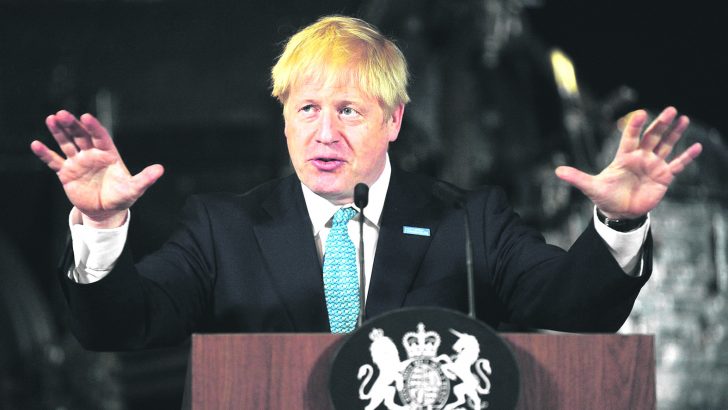One of last week’s biggest news stories was the election of Boris Johnson as leader of the UK Conservative Party and therefore Prime Minister. It has made for some fascinating political discussions in the media.
Last weekend, Sunday (BBC Radio 4) asked the question ‘Does Boris do God?’ It was an interesting discussion but rather light on detail – lots of speculation without much evidence. One of the many resignations that happened on Boris’ elevation was that of Mohammed Amin, Chair of the Conservative Muslim Forum. He said he had a problem with the new PM’s ‘moral approach to life’ and his comments about Muslim women wearing Burkas – likely to lead to these women being abused in the street. Johnson was baptised Catholic but confirmed Anglican, though we didn’t find out why there was a switch. Apparently he has said that his faith ‘comes and goes’ like poor radio reception!
Theologian Theo Hobson reckoned that ‘religion exposes his shortcomings’ and that he finds religion useful for social order and for the country’s traditions. Philip Blond of the Res Republica think tank thought Johnson didn’t seem to uphold ‘the idea of objective truth’. He thought the key question was whether Johnson would pursue ‘the general good’, the interests of everybody, or whether he would pursue ‘partisan good’. He wondered whether Johnson might grow into his role as PM.
On last Thursday’s The Pledge (Sky News) his sister Rachel, a remainer on the Brexit issue, was in an awkward position, but she urged other panellists to concentrate on her brother’s policies rather than making personal attacks. On last Sunday’s Marian (RTE Radio 1) journalist Sam Smyth and artist Annabel Eyres, who knew Boris personally, gave some useful insights into his character and, unlike most Irish media coverage, it was mostly positive on a personal level, though they didn’t agree with his politics.
Back in the UK, last week’s Panorama (BBC One, Monday, BBC Two Friday) covered the abortion issue in the USA, in the light of recent state restrictions. One pro-choice contributor suggested that the motivation behind these moves is to force a challenge to Roe v Wade (the Supreme Court decision that struck down anti-abortion laws), especially now that the Supreme Court has potentially a conservative majority.
In one clinic we saw a doctor performing an abortion, which rattled the presenter Hilary Andersson. Unsurprisingly it was tough to watch the taking of an innocent life, though the programme wasn’t portraying it in those terms. However it was sanitised – when the same doctor did a live delivery later there was celebration and we saw the new-born baby, but with the abortion, no sign of the dead baby. At this clinic the presenter said volunteers were shielding the clients from ‘vitriol’. We heard one of the protestors calling out ‘We want to hug you’!
Later we had a chilling interview with a doctor who does late terminations. He calls them ‘babies’ and when asked if he had problems with ‘killing a baby’ said he didn’t as long as the baby was in the uterus (where, one might have thought, the baby should be safest of all). He frankly described the administering of a fatal injection and the crushing of the dead baby’s skull. He wouldn’t even say what gestational limit he’d apply. The interviewer didn’t ask about partial birth abortions, but it was still repulsive in the extreme.
Pro-lifers are often accused, judgementally and without evidence, of not caring about babies after they’re born, but one lady, Kandi, who had an abortion herself, looks after babies that have been saved from abortion, even when, as in one sad case, the baby in question has a severe skin disease. For her ‘there’s great hope in adoption’.
Though the pro-life position was well represented, the programme makers characterised the opposition to abortion as solely a religious thing, coming primarily from evangelicals. They ignored the human rights opposition to abortion, and likewise the Catholic Church’s ‘seamless garment’ advocacy on all life issues. I didn’t like the presenter’s use of terms like ‘rapist’s child’, with mentions of ‘backstreet abortions’ and association of rights based approach with pro-choice side primarily. Even the framing of the initial question was telling: ‘We ask, could women here lose the right to abortion?’ Why not suggest also that babies might be regaining rights?
At least it showed that this issue isn’t going away as our local pro-choice activists would like to think.


 Brendan O’Regan
Brendan O’Regan
